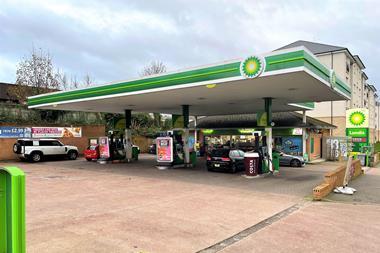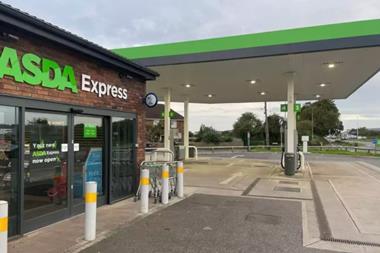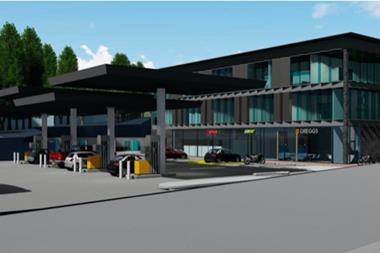The past 12 months has been one of the busiest periods in recent history in the forecourt property sector, according to Adam Wadlow, director at property adviser, Barber Wadlow. "We estimate that there have been over 1,100 petrol stations sold or let since the end of 2011, which represents an incredible 12% of the total number of forecourts (8,765 sites). But despite such an abundance of market activity, the general public’s perception of the sector is similar to that of pubs that all appear to be closing!"
Wadlow adds that the UK fuel retail network is down to 8,765 sites (more than one in three closures have occurred since 2000), but it is the survival of the fittest, with national average fuel volumes and shop sales improving year-on-year, which is having a positive influence on value, as demonstrated in the latest Barber Wadlow Petrol Station Property Value (PSPV) Indices on page 38.
Allen Shepherd, director of corporate retail at Christie & Co, agrees with Wadlow about the current spate of activity saying that overall there is a really positive vibe in the market.
"It’s a case of evolve or decline so lots of forecourt retailers have looked at their businesses. They have cut wastage; cut shrinkage; become more efficient and more cost conscious; and streamlined their business to boost their bottom line."
For most forecourt retailers, this means concentrating more on their shop.
"There are lots of opportunities to buy from oil companies. You will pay more for these sites but the potential is tremendous. They’ve usually got a poor retail offer so there’s a lot of opportunity to better that business," says Shepherd.
He adds that there have been more instances of forecourt operators talking to each other in the past year, and working as a team. "There has been a lot more interaction which has been a breath of fresh air in the market."
Of course, a lot of the activity in the market has been done behind closed doors, so nobody hears about it until the deal is done. David Collins, partner at Adlers, says ingenuity has been required to pull together deals and see them through to conclusion in a difficult funding market.
"We have transacted a number of smaller deals on a confidential basis. We were involved in the sale of Nesscliffe Services, which went into administration earlier this year.
Collins says difficulty in obtaining funding has probably thwarted potential new entrants to the market and expansion for smaller operators.
"There are lenders out there but the proposition has to be without flaws. This is more of a problem for new entrants to the market and smaller operators. Established operators will still be able to obtain funding but the terms may be more onerous."
For those who know what they are doing and who have paid down debt, there are funds available, says Shepherd. "Private equity companies have an appetite for bigger groups."
Adam Wadlow agrees: "Private equity in the fuel retailing market is making a statement, owning large stakes in three of the top five independent retailers in the UK Malthurst (MRH), Rontec/Snax 24 and MFG (Motor Fuel Group) and in respect of the latter, Barber Wadlow advised the private equity consortium on the acquisition of this 48-site business in December 2011.
"Further private equity-backed investment is forecast through continued forecourt acquisition."
Shepherd also points to a shift to leasing. "If you’ve got a £750,000 site and can’t sell it for that, some operators are leasing it and living off that income. And the more successful operators are leasing their bigger units then using the cash to buy under-developed sites. They reinvest heavily, turn it into a really great site, then sell it on."
For Rapleys, its main disposal activity in 2012 related to the package of 43 Rontec forecourts, which it jointly marketed with CBRE.
Peter Nicholas, partner in motor trade and roadside at Rapleys, says: "In terms of acquisitions we act on behalf of Morrisons and last year acquired a number of forecourts with synergy to its existing supermarket stores, notably in Redruth, Wetherby, Oswestry, Crawley, Brough, Seaford and Whitefield.
"From our point of view therefore, it was a busy year with plenty of activity, albeit the sector continues to consolidate with the supermarket and convenience retailers strengthening their position.
"Our experience from the Rontec disposal, where sites were primarily sold to independent operators, was that the finance was still key to the transaction and would-be purchasers still had to ’jump through hoops’ in order to secure funding."
For this year, Nicholas predicts this trend is likely to continue with supermarket operators such as Morrisons, Sainsbury’s and Asda on the acquisition trail while smaller dated facilities with limited prospect of enhancement of the retail and ancillary profit centres will continue to disappear from the sector.
Selling
If you’re thinking of selling, you need to get your story straight, says Tom Rigg, senior surveyor, automotive and roadside at GVA.
"If you’re selling to retire or to move abroad make sure you say so otherwise would-be buyers will think it’s a distress sale. You need to make sure people know you are choosing to sell rather than being forced to sell, as this will affect the price. It’s a difficult time to sell so you need to get your story straight."
He says his company has had a lot of work this year advising the banks. "Many five-year loans are coming to an end and banks are asking our advice on whether they should extend the loan or not."
Allen Shepherd says sellers need to be ’open and transparent’.
"They need to have wet-stock reports, tank information, environment information, epos statements and fuel supply agreements.
"There is definitely a fear of the unknown. If you have any outstanding planning issues you need to get them boxed off before the sale."
He also recommends total honesty: "If you say you have a problem with drive-offs, people can buy into your honesty. If you hide the truth it will put people off.
"And, of course, you need to get the correct professional advice."
Adlers’ David Collins agrees that sellers need to have good records in place. "Without proper detailed records, it will be far harder for a bank to support funding. Also, sellers should be realistic regarding price expectations otherwise the property will not sell or the sale will become abortive further down the line, when both parties have incurred considerable costs. Similarly, buyers should carry out as much due diligence as possible prior to commitment to purchase for the same reasons.
Major players in the market in 2012
Barber Wadlow’s latest Forecourt Property Market Update (to be officially launched in January 2013 please contact Barber Wadlow for a copy), comments that over 30% of the UK’s forecourt network is now owned by major oil companies and supermarket operators, as detailed in the table below:
Over the past 15 years, the oil companies have been rationalising their retail networks in order to concentrate on exploration activity, either exiting the industry entirely or shedding all but the better-quality assets.
Adam Wadlow, director at property adviser Barber Wadlow, explains: "The Esso company-owned network has shrunk by 23% and BP by 12%. Since 2004, Total and Texaco have all but sold up completely.
"By contrast, Murco’s network has grown by nearly 150% and Shell in 2012 has also bucked the disinvestment trend, increasing its network by 40% as a result of its recent acquisition of the Total sites. The rationale for this may not yet be clear, but Shell does now control a strong and substantial portfolio.
"The supermarket operators have continued to acquire forecourts, with the Asda and Tesco networks growing by around 30% over the past eight years. The Tesco forecourt network is nearly double the size of its nearest competitor, which helps explain why the likes of Morrisons and Asda have been acquisitive during 2012."
The big stories
Rontec (the private equity consortium led by Gerald Ronson) took possession of around 500 Total sites and immediately ’flipped’ around 250 to Shell.
Barber Wadlow advised Patron Capital on its acquisition of the fourth largest independent retailer, Motor Fuel Group (48 sites).
Barber Wadlow advised Harry Tuffins on the disposal of its 11-site business to Mid-Counties Co-Op.
Sainsbury’s acquired 18 sites from Rontec, marking the company’s return to the fuel/c-store market. Apparently nine will be forecourt/convenience stores and the other nine standalone c-stores.
Asda and Morrisons acquired various sites across the UK as an ancillary fuel offer to superstores. Asda’s acquisitions included two sites where it will trial its Click & Collect concept.
Barber Wadlow acting for independent retailer, James Graven, let the company’s two sites in Cambridgeshire to BP in September 2012.
Euro Garages agreed terms to acquire 43 sites in the North West and Northern England from Esso.
Irish independent retailer, Petrogas (trading as Applegreen) continues to acquire sites, bringing its combined Irish/UK network to 95.
BARBER WADLOW Petrol Station Property Value (PSPV) Indices
Despite the large number of forecourts offered for sale, there hasn’t been a ’flooding’ effect or an adverse impact on values. The Barber Wadlow PSPV Indices (in association with Catalist) shows that in 2012, values have remained relatively stable, increasing by 1% for the average site, as shown in the table (right).
Adam Wadlow, director at property adviser Barber Wadlow, explains: "Every petrol station is unique and it is therefore difficult to compare one transaction directly with another, but this indices (representative of the "average trading site") helps demonstrate the sustainability of the market.
"Forecourt values have been recorded at anywhere from £150,000 to in excess of £3.5m and, of the transactions we have been involved with, there has been a noticeable appreciation in value for the prime sites, with demand intensifying from supermarket operators and oil companies. It should, however, be acknowledged that, at the bottom end of the scale, demand is much thinner and notably the sale period is often protracted. The market can therefore be described as ’multi-tiered’.
"Financing remains a challenge as retailers wrestle with a new era of bank funding and a new set of ’rules’ borrowers are being put under increasing pressure on all areas be it demonstrating serviceability of debt, loan-to-value ratios, amortisation...the list goes on. Changes in the world of bank funding have undoubtedly had an influence and will no doubt continue to curb market activity.
"One of the knock-on effects of poor funding liquidity has been an increase in leasehold transactions with a positive influence on rental values. Barber Wadlow has secured rental increases of up to 50% at rent review on certain sites in the past 12 months."






























No comments yet